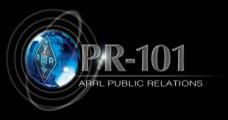|
You are on Page 9 of Section 4 |
|
● Introduction & Index
● What is PR
● Job Expectations
● Types of Media
● Building Relationships
● Media, Hams & FCC Rules
● The Basic News Release
● Interviews and Live
● Making your own show
● Easy P.R.
● Public Service Events
● Piggy-back to Events
● Pictures NOW!
● P.R. Research Aids
● Making Friends
● ARES® PIO
● Final Exam Information
|

|
Backgrounders
There is basic information about Amateur Radio which a reporter needs to have to cover your story. This material really does not change, but without it your ham radio story will get confused and factual misinformation will result. The ARRL makes “backgrounders” available to you for this purpose. Just download them at http://www.arrl.org/arrl-backgrounders
American Radio Relay League Fact Sheet What is Amateur Radio? The American Radio Relay League News Gathering and Amateur Radio Amateur Radio Emergency Communication Using Amateur Radio in an Emergency How ARRL’S Public Relations Program Works Ham Radio Licenses
One or more of these backgrounders should accompany almost any ham radio related press release, and ALL of them should be in your go-kit.
Viral Networking
This modern phenomenon that sounds like a dreaded disease has rocked the news and PR fields. You may remember the YouTube video of the Diet Coke and Mentos guys at http://www.youtube.com/watch?v=hKoB0MHVBvM.
Those were YouTube videos that “went viral.” Without any planning and no guidance, people spotted them and told their friends. Those friends told more friends, and on and on it went. ”Social networks” such a LinkedIn, Twitter, Facebook and similar sites helped to quickly spread the word, but the main means was simply “Hey, look at this!” emails between friends and coworkers.
Viral networking might seem to be a wonderful phenomenon of this century, but it also has its downside. In the past national election, viral networking was also the source of many hateful and false claims. Many people still have the false belief that if they see it in print, even on the web, then it must be true.
As hams, we see something close to viral networking regularly. “Ham It Up” is an over-worn and really tiresome headline. But it is used again and again despite correction because people see it on the web. Another one is “Ham radio is dying” and it’s been decried for decades. (Hint - we’re still here!). One of the problems that we, and many other groups, will have to deal with is that when everyone gets to post and publish their opinions, then everyone looks equally authoritative on the web. The real facts and information are often lost in the noise. |